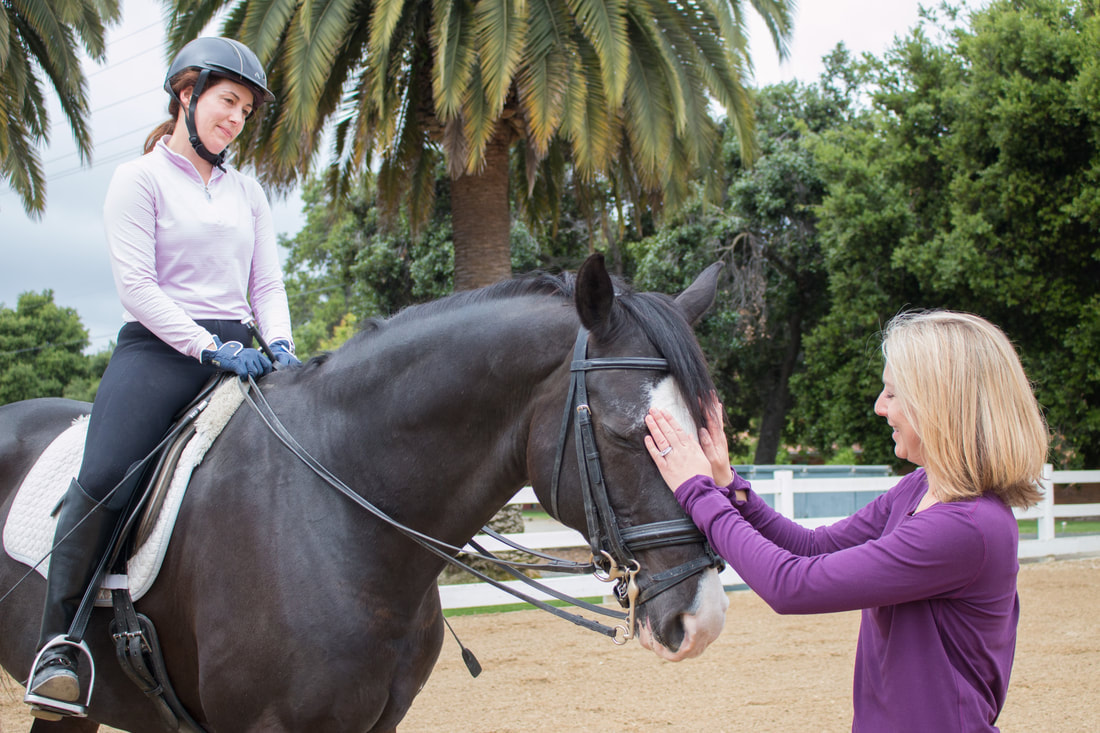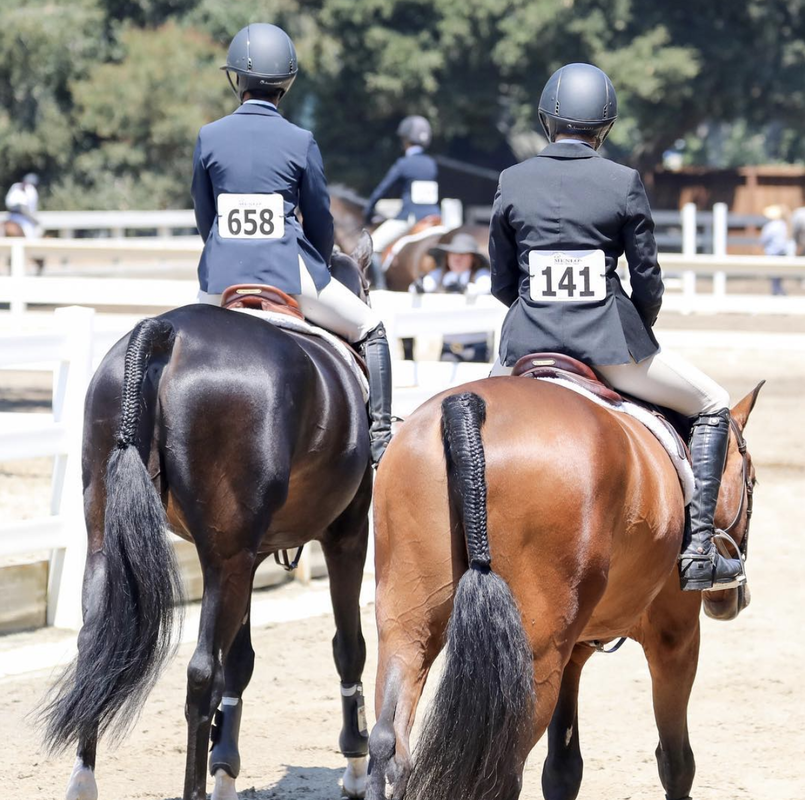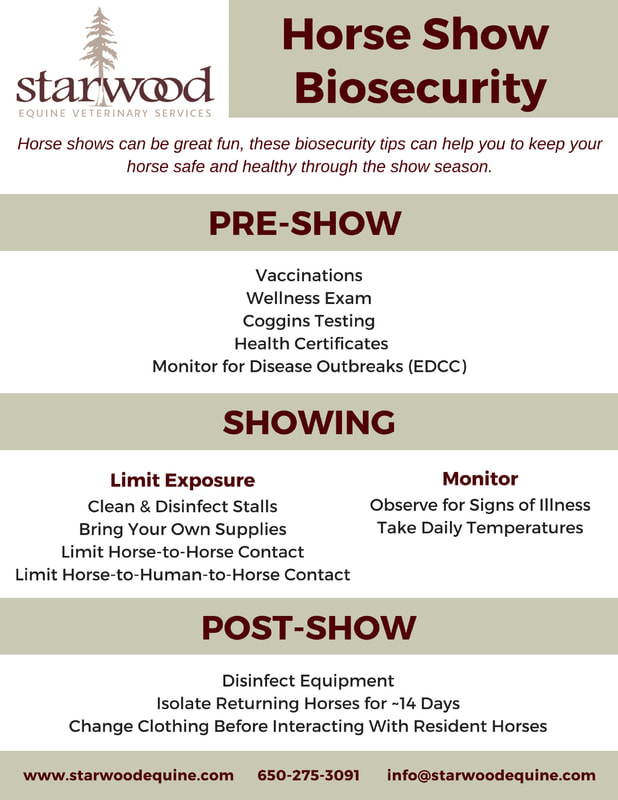|
Show season is in full swing and the staff at Starwood Equine would like to remind horse owners of the importance of practicing proper biosecurity, as there is always disease risk when horses of unknown health status are intermingling at a competition. While you cannot eliminate the risk, you can reduce it with the following biosecurity tips: Pre-Show CareSchedule a wellness exam to ensure that your horse is fit for travel and competition as well as up to date on vaccinations. This is a great time to discuss your showing schedule with your veterinarian to determine if any additional vaccines may be needed based upon your expected travel. It is also a good opportunity to perform Coggins testing, pre-schedule health certificate checks, and record baseline vitals. If your equine athlete shows signs of fever, nasal discharge, and diarrhea prior to travel it is best to keep the horse home. Be aware of current disease outbreaks. The Equine Disease Communication Center (EDCC) is a communication system designed to seek and report real time information about disease outbreaks similar to how the Centers for Disease Control and Prevention (CDC) alerts the human population about diseases in people. Click the link below to sign up for the email alerts. At-Show CareWhile on the show grounds, limiting exposure and monitoring your horse will help you to minimize your equine athlete’s risk of disease. Limit ExposureClean and disinfect your horse's stall(s). One of your first showgrounds tasks should be to disinfect the stalls. Leftover manure, shavings, and dirty walls are potential hazards. Remove all bedding remnants and use a disinfectant of your choice on stall walls, especially built-in feeders. Diluted bleach (8 oz bleach to 1 gallon of water) is an inexpensive disinfectant option. Rinse the stall thoroughly.
Bring your own supplies. Portable stall mats can serve as a barrier between your horse and a dirt floor, which is difficult to disinfect. Using your own feed tubs and water buckets minimizes the chances of your horse accessing nasal secretions from other horses. Avoid sharing of equipment (feed/water buckets, hay bags, grooming tools, tacks, or manure forks) unless thoroughly cleaned and disinfected between uses. Remember to disinfect these items before and after the show to prevent the spread of disease. Hold showground hoses out of the water when filling buckets to avoid water contamination from those who may have dropped the hose in their bucket before you. Limit horse-to-horse contact by keeping your horse separated from other horses as much as possible. It is especially important to not allow horses to have nose-to-nose contact. Also, discourage drinking out of communal water sources. Limit horse-to-human-to-horse contact by limiting the general public’s contact with your horses and your contact with other horses. Wash your hands frequently and keep your own supply of hand sanitizer. Monitor During and after your show, keep a close eye on your horse. Often, a higher temperature is the first indication you’ll see that your horse isn’t well. We recommend taking your equine athlete’s temperature at least once daily. The temperature taken at the wellness exam with your veterinarian will provide you with a baseline for comparison of what is normal for your individual horse. Observe animals daily for signs and symptoms of illness, such as: Fever Lethargy Overall weakness Obvious pain or discomfort Discharge from nasal cavity or eyes Decrease in appetite and water intake Diarrhea or changes in consistency in manure If you suspect your horse is getting sick, contact your vet right away to stay ahead of the disease. Post-Show Care Upon returning home from a show, it is recommended that returning horses be isolated from resident horses for 14 days. Monitor horses daily for signs of fever, nasal discharge, and diarrhea. Inanimate objects (water buckets, hay bags, grooming tools, tacks, or manure forks) can serve as fomites, transferring infectious organisms from one location/individual to another. It is best to disinfect these items regularly, especially after arriving home from an event. To avoid spreading anything yourself, wash your hands, shower, and change clothing and shoes before working with horses kept at home. Horse shows can be great fun, these biosecurity tips can help you to keep your horse safe and healthy through the show season. We love to see all of our equine athletes in action, don't forget to tag #HorsesofStarwood. Please feel free to print or share a copy of our Horse Show Biosecurity Guide below
1 Comment
|
Topics
All
Archives
May 2021
|
Privacy Policy | Copyright © 2019 Starwood Equine Veterinary Services, Inc. All rights reserved.




 RSS Feed
RSS Feed